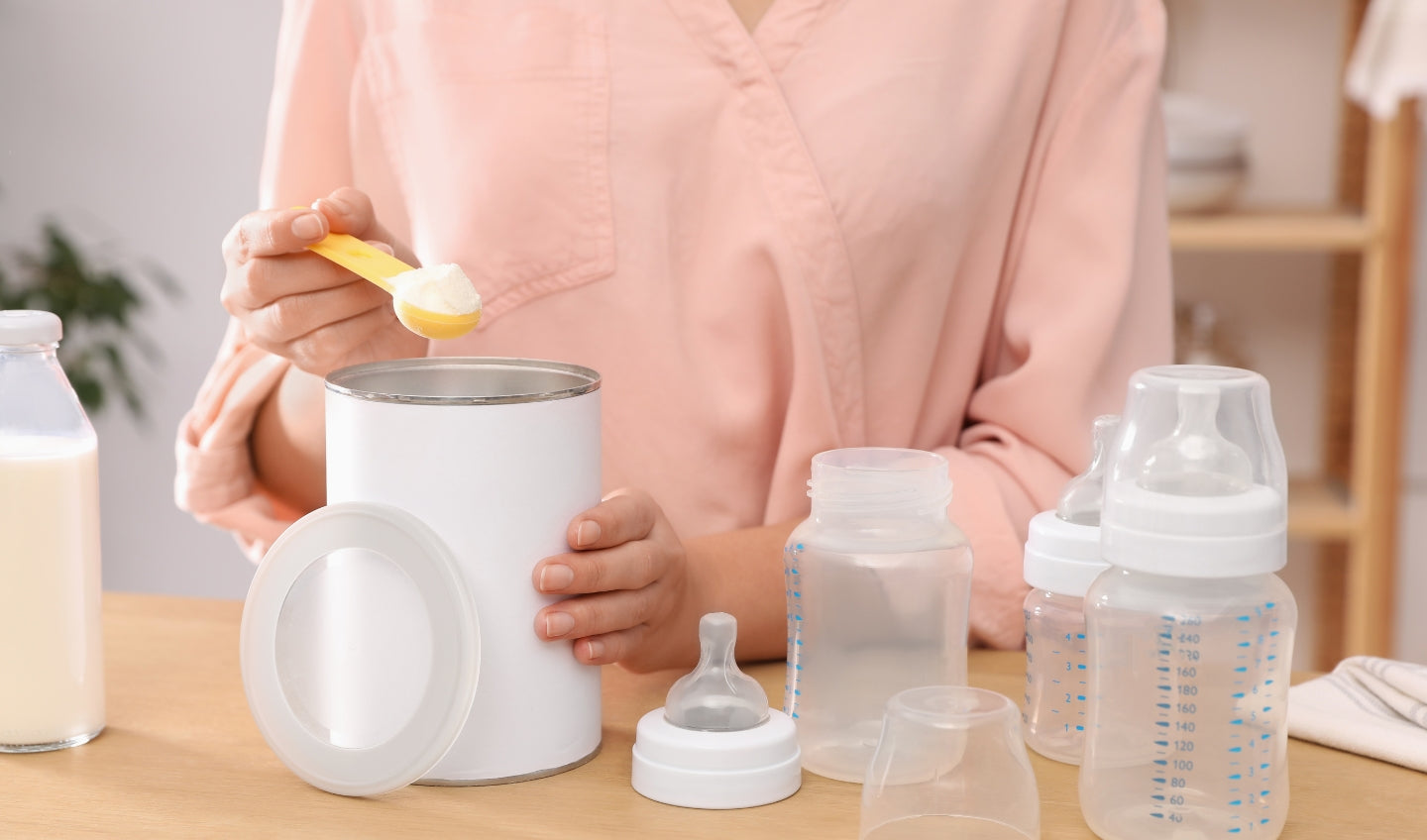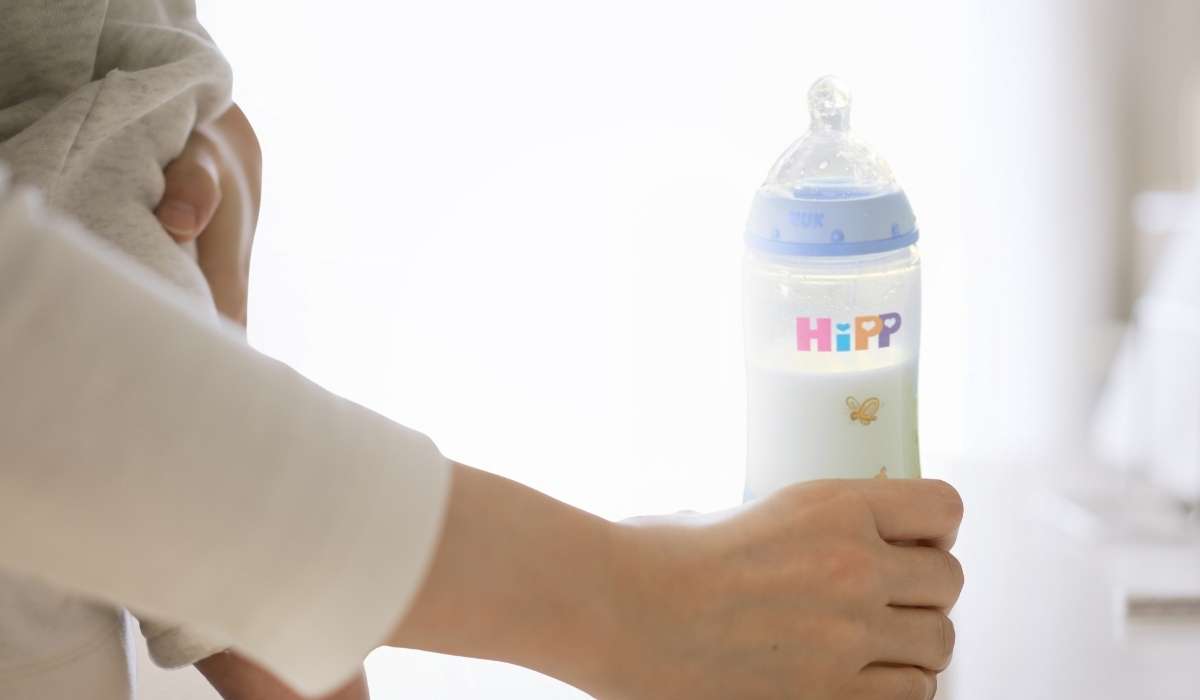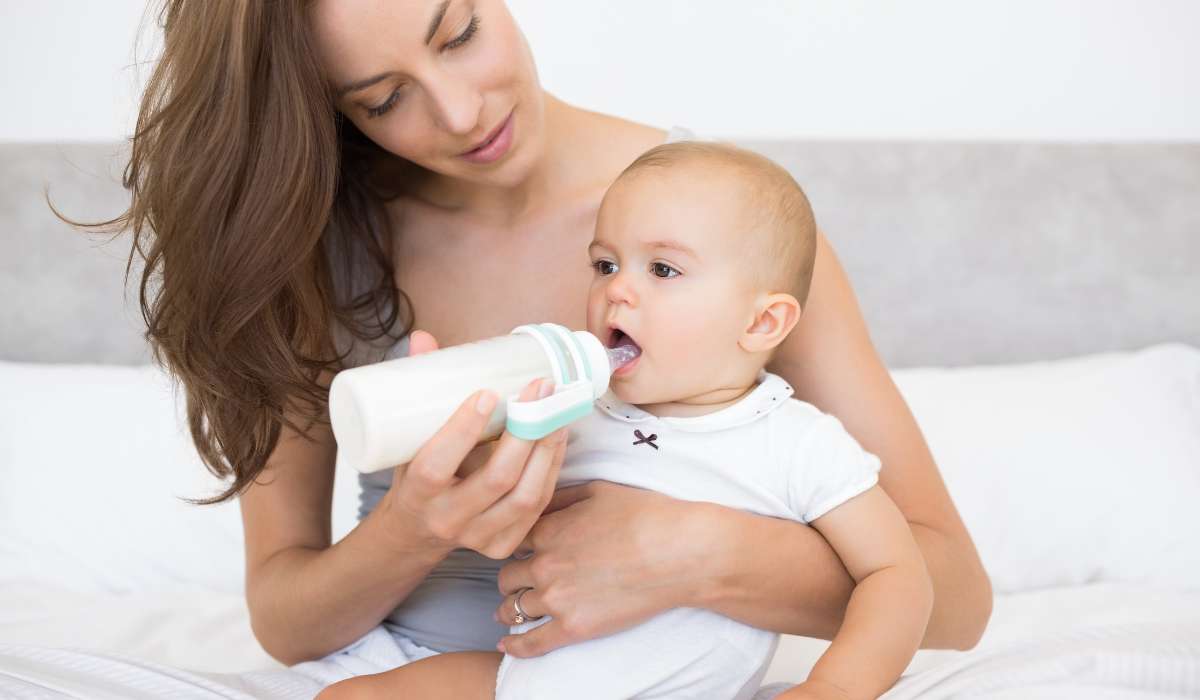Raising a child requires parents to make many important decisions, and one of them is: Should I feed my baby with liquid or powdered formula?
Today, we want to help you answer this question! We will take a closer look at both types of baby formula, help you choose one based on your baby's needs, and share some tips on how to prepare your baby's bottle safely regardless of the type of formula.
Contents
- Understanding the Differences: Liquid Formula vs Powder Formula
- Why You Should Choose Liquid Formula (Pros and Cons)
- Benefits and Drawbacks of Powdered Infant Formula
- Factors to Consider When Choosing Liquid Formula vs Powdered Formula
- Liquid Formula vs Powder for Newborns: Popular Brands and Products
- How to Safely Prepare and Store Liquid Formula vs Powder Formula
- Frequently Asked Questions About Liquid Formula vs Powder Formula
Understanding the Differences: Liquid Formula vs Powder Formula
First, we want to clarify that liquid formula does not always mean ready-to-feed. Ready-to-feed formula is a kind of liquid formula that is good to drink as soon as you open the container, no prep needed!
On the other hand, there are also liquid concentrates. In this case, you need to mix the concentrated liquid formula with water before feeding your baby.
Powdered formula, as the name suggests, comes in the form of loose powder that must be mixed with water before feeding.
The nutritional value of each type of formula is the same; the main differences lie in preparation, price, and shelf life.

Why You Should Choose Liquid Formula (Pros and Cons)
Let's cut to the chase: liquid baby formula is the most convenient option for busy parents. It doesn't take much time to prepare or make much of a mess and is easier to deal with on the go. Additionally, liquid formulas prevent the annoying clumps that some powdered formulas form in your baby's bottle.
Ready-to-feed formulas, in particular, are an excellent solution for emergency feedings and on-the-go situations. Wherever you are, you can always grab a bottle and make sure your little angel is fed and satisfied!
Another pro is that ready-to-feed baby formula is sterile, which is particularly beneficial for preemies or babies with a compromised immune system.
As for the downside, liquid baby formula doesn't come cheap. So, if you're on a tight budget, choosing a liquid concentrate or ready-to-feed formula may not be a realistic option.
Benefits and Drawbacks of Powdered Infant Formula
Many parents choose standard powder formula due to its greater affordability and availability. Powdered formula also has the advantage of a longer shelf life than liquid concentrate formula or ready-to-feed options.
Then again, some parents may avoid powdered formula because they don't want to deal with the hassle of mixing it. Working with powder is more time-consuming and can lead to unwanted milk clumps if not combined properly.
Interestingly, some studies suggest babies fed powdered formula might be at a higher risk of weight gain. This doesn't mean that powdered infant formula will cause your baby to become overweight.
Researchers agree that these findings are caused by preparation errors when parents use too much powder for each feeding. As long as you mix formula according to the instructions, your baby's weight gain should be within a healthy range!
Factors to Consider When Choosing Liquid Formula vs Powdered Formula
While the previously mentioned pros and cons may have some weight when trying to choose between different forms of formula, there are a few more aspects to consider. They include:

-
Your baby's nutritional needs - Some babies need soy formula, and others may require a goat milk formula or a hypoallergenic option. Unfortunately, not all of these are available in liquid form. In this case, your decision won't depend on convenience or preference. Naturally, your baby's nutritional needs will dictate your choice.
-
Lifestyle factors - If you often travel or don't want to deal with mixing formula, then a liquid option might be your go-to. But if you are on a tighter budget, powdered formulas are a more affordable choice.
-
Formula packaging - If you're looking for an environmentally-friendly option, powdered formula is the best. Ready-to-feed and liquid concentrate formulas use more plastic. You'll be happy to know many of the powdered formulas we carry from HiPP and Holle are produced carbon neutrally or carbon positively for a reduced environmental impact!
Remember, all babies have different needs, and a medical professional can help you determine the right choice for your child.
Liquid Formula vs Powder for Newborns: Popular Brands and Products
The most popular liquid formula options are from HiPP. They offer ready-to-feed versions of their best-selling Bio Combiotic and Hypoallergenic (HA) formulas for newborns.
HiPP Bio Combiotic Ready-to-Feed Stage PRE is suitable from birth to 6 months. This organic formula contains probiotic lactic acid cultures originally derived from real breast milk, making it a closer substitute to human milk. And because it has no maltodextrin or starch, this gentle lactose-based formula is soft on your newborn baby's belly.
HiPP HA Ready-to-Feed Stage PRE is also suitable from birth to 6 months. This gentle infant formula is made using hydrolyzed skimmed cow's milk and is enriched with pro and prebiotics. This hypoallergenic option is a great choice for babies at a higher risk of developing allergies. Although it may not be suitable for babies with a diagnosed or suspected case of cow's milk protein allergy.
For parents that prefer a powder formula, the most popular ones we offer are cow's milk infant formulas from leading European brands like HiPP, Holle, and Kendamil Organic.
HiPP Bio Combiotic is also available as powder, this version offers a greater range of stages ranging from birth to 24+ months.
Alternatively, Holle offers premium organic and biodynamic milk in their cow formula range. There are options for different developmental milestones, from birth to 12+ months.
Finally, Kendamil Organic's cow's milk formula boasts naturally occurring Human Milk Oligosaccharides (HMOs), which help nourish your baby and support their immune system. They have formulas suited for newborns all the way to babies from 12+ months.
How to Safely Prepare and Store Liquid Formula vs Powder Formula

When it comes to liquid concentrate formula, preparation is quite simple. Use the amount of formula specified in the instructions on the packaging and mix it with safe water.
If you're using ready-to-feed formula, the steps are even easier. Simply open the bottle and give it to your little one. And if you don't use liquid formula right away, you can keep it in the fridge for up to 24 hours.
Lastly, for powdered baby formula, mix the recommended amounts of safe water and formula powder and combine thoroughly to avoid clumps. If you don't feed your baby after mixing, you can keep it in the fridge for up to 24 hours.
Frequently Asked Questions About Liquid Formula vs Powder Formula
Q: Can you mix liquid and powder formulas?
A: It's okay to mix two formulas temporarily if you are trying to gradually transition from one to another.
Q: How long can unused prepared formula be stored?
A: Prepared liquid formula and powdered formula can be kept in the fridge for up to 24 hours. Always follow the manufacturer's instructions.
Q: Can you switch between liquid and powder formula?
A: Yes, it's okay to switch as long as you continue to use the same type (for instance, cow's milk).
Q: Are there any differences in taste or texture?
A: The texture may vary slightly, but the difference isn't typically that drastic.
Wrapping Up: Choosing the Best Formula Type for Your Baby's Needs
There are plenty of liquid and powdered formulas for babies, so your little one will certainly get what they need. The essential step is considering your baby's needs and your lifestyle; talk to a pediatrician to get personalized advice and recommendations that fit your family.
Breast milk is the best source of nutrition for babies. Before altering your baby's diet or feeding routine, consult your healthcare provider for personalized recommendations. The information in this article is strictly for informational purposes and is not a substitute for medical advice.





